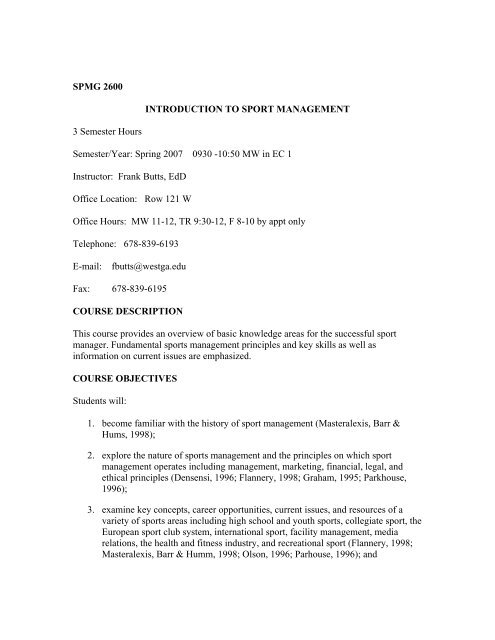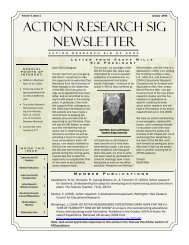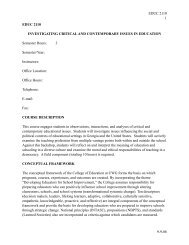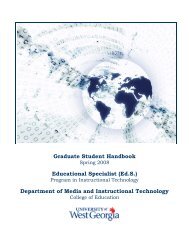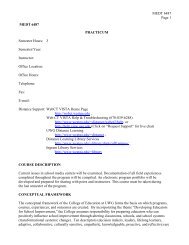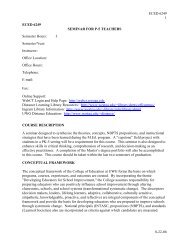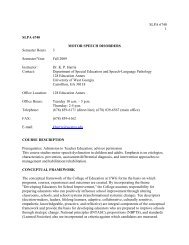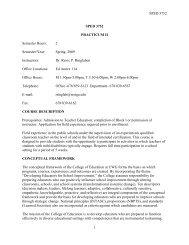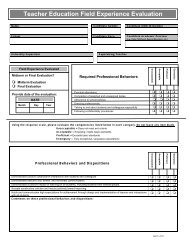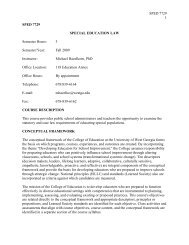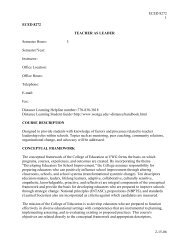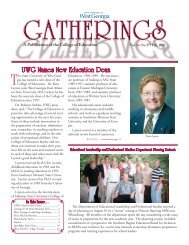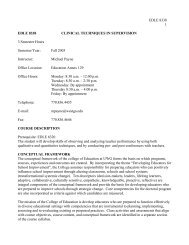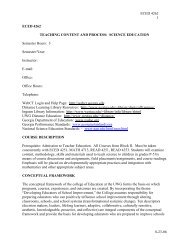SPMG 2600 INTRODUCTION TO SPORT MANAGEMENT 3 ...
SPMG 2600 INTRODUCTION TO SPORT MANAGEMENT 3 ...
SPMG 2600 INTRODUCTION TO SPORT MANAGEMENT 3 ...
Create successful ePaper yourself
Turn your PDF publications into a flip-book with our unique Google optimized e-Paper software.
<strong>SPMG</strong> <strong>2600</strong><br />
3 Semester Hours<br />
<strong>INTRODUCTION</strong> <strong>TO</strong> <strong>SPORT</strong> <strong>MANAGEMENT</strong><br />
Semester/Year: Spring 2007 0930 -10:50 MW in EC 1<br />
Instructor: Frank Butts, EdD<br />
Office Location: Row 121 W<br />
Office Hours: MW 11-12, TR 9:30-12, F 8-10 by appt only<br />
Telephone: 678-839-6193<br />
E-mail: fbutts@westga.edu<br />
Fax: 678-839-6195<br />
COURSE DESCRIPTION<br />
This course provides an overview of basic knowledge areas for the successful sport<br />
manager. Fundamental sports management principles and key skills as well as<br />
information on current issues are emphasized.<br />
COURSE OBJECTIVES<br />
Students will:<br />
1. become familiar with the history of sport management (Masteralexis, Barr &<br />
Hums, 1998);<br />
2. explore the nature of sports management and the principles on which sport<br />
management operates including management, marketing, financial, legal, and<br />
ethical principles (Densensi, 1996; Flannery, 1998; Graham, 1995; Parkhouse,<br />
1996);<br />
3. examine key concepts, career opportunities, current issues, and resources of a<br />
variety of sports areas including high school and youth sports, collegiate sport, the<br />
European sport club system, international sport, facility management, media<br />
relations, the health and fitness industry, and recreational sport (Flannery, 1998;<br />
Masteralexis, Barr & Humm, 1998; Olson, 1996; Parhouse, 1996); and
4. increase their awareness of strategies that can be used to successfully find a career<br />
in sport management (Appenzeller, 1999; Bucher, 1997; Graham, 1995;<br />
Masteralexis, Barr & Hums, 1998);<br />
TEXTS, READINGS, AND INSTRUCTIONAL RESOURCES<br />
Required Text: Parkhouse, B. (2005). The Management of Sport. NY, NY: McGraw-<br />
Hill.<br />
References:<br />
Appenzeller, H. (1999). Risk management in sport: Issues and strategies. Durham, NC:<br />
Carolina Academic Press.<br />
Bucher, C.A., & Krotee, M.L. (1997). Management of physical education and sport.<br />
New York: McGraw-Hill.<br />
Chelladurai, P. (1985). Sport management. London, Ontario: Sports Dynamics.<br />
Desensi, J. T. (1996). Ethics in sport management. Morgantown, WV: Fitness<br />
Information Technology.<br />
Dougherty, N.J., & Bonanno, J. (1985). Management principles in sport and leisure<br />
services. Minneapolis, MN: Burgess Publishing Company.<br />
Farmer, P.J. (1996). Sport facility planning and management. Morgantown, WV: Fitness<br />
Information Technology.<br />
Flannery, T.E. (1998). Personnel management for sport directors. Champaign, IL:<br />
Human Kinetics.<br />
Graham, S (1995). The ultimate guide to sport event management and marketing.<br />
Toronto, ON: Irwin Professional Publisher.<br />
Mull, R.F. (1997). Recreational sport management. Champaign, IL: Human Kinetics.<br />
Olson, J.R. (1996). Facility and equipment management for sport directors. Champaign,<br />
IL: Human Kinetics.<br />
Parkhouse, B.L. (1996). The management of sport: Its foundation and application. New<br />
York: McGraw-Hill.<br />
Sawyer, T., & Smith, O. (1998). The management of clubs, recreation, and sport:<br />
Concepts and applications. Champaign, IL: Sagamore Publishing Company.
Stier, W.F. (1999). Managing sport, fitness, and recreation programs: Concepts and<br />
practices. Boston, MA: Allyn & Bacon.<br />
Ziegler, E.F., & Bowie, G.S. (1983). Management competency development in sport and<br />
physical education. Philadelphia, PA: Lea & Febiger.<br />
Support URLs<br />
• Sport Management, Inc. http://www.sportmanager.com<br />
• Journal of Sport Management @UNB http://www.fitinfotech.com/books/sml.html<br />
• Sport Management http://www.sport.ussa.edu/programs/sportman.htm<br />
• Elite Sport Management Group: Home Page http://www.elitesport.com/<br />
• Sport Management http://www.educ.iastate.edu/HHP/sportman.htm<br />
• Master of Sport Management http://www-it.cowan.edu.au/acserv/hbook99/pg/b<br />
• Sport Management Association of Australia and New Zealand Sydney 2000<br />
Conference http://www.gu.edu.au/school/1st/services/smaan<br />
• Sport Management Program Objectives<br />
http://www.yorkcol.edu/education/spobj.html<br />
ASSIGNMENTS, EVALUATION PROCEDURES, AND GRADING POLICY<br />
1. Students will take mid-term exam on assigned date.<br />
2. Student will take final exam on assigned date.<br />
3. Students will be evaluated on professionalism and participation in class and class<br />
projects as assigned by instructor.<br />
4. Students will prepare and deliver oral presentation in front of class on assigned<br />
date, following assigned guidelines related to content, preparation, voice and<br />
diction, and dress. The topics will be assigned the first week of class.<br />
5. Students will attend and participate in class discussions in an attentive, respectful,<br />
knowledgeable manner.<br />
Evaluation Procedures:<br />
1-Exams will be worth 100 points each<br />
2-The “Professionalism” grade will be worth 25 points and will be derived as follows. If<br />
students arrive on time, respond professionally, dress appropriately, prepare adequately<br />
and participate in the class discussions, they will be given 1 point for each day of class<br />
(excluding the two examination days).<br />
3-The student presentation will be worth 20 points derived as follows:<br />
4pts- covers assigned topic on assigned date<br />
4pts- presentation last between 21/2 -3 minutes<br />
4pts- student displays evidence of extensive research<br />
4pts- student articulately communicates his/her findings to class<br />
4pts –professionalism
Grading Policy:<br />
Grades will be assigned based upon the total points possible in the course. All points will<br />
be totaled. The final grade in the course will be assigned according to the percentage of<br />
total points the student achieves:<br />
A = 90-100%; B = 80-89%; C = 70-79%; D = 60-69%; F = below 60%<br />
General Policies:<br />
1. Written exams are to be taken at assigned class time.<br />
2. Students are expected to attend all classes.<br />
3. Students are expected to arrive at class on time and prepared.<br />
4. Cell phones and I-pods must be turned off during class.<br />
5. Students must be present for exams. No make ups unless prior approval with a<br />
University of West Georgia excused absence.<br />
6. Students may be asked to remove hats when entering classroom.<br />
7. Students may be locked out of class if they are late.<br />
8. Students will be expected to act and perform professionally while in the class.<br />
9. Students are expected to adhere to the highest standards of academic honesty.<br />
Plagiarism occurs when a student uses or purchases ghost-written papers. It also occurs<br />
when a student utilizes the ideas of or information obtained from another person without<br />
giving credit to that person. If plagiarism or another act of academic dishonesty occurs, it<br />
will be dealt with in accordance with the academic misconduct policy as stated in the<br />
Undergraduate Catalog, and Graduate Catalog.<br />
10. As per university policy, the official communication method with students will be through<br />
campus e-mail (My UWG).<br />
11. Per university policy, no material prepared to meet requirements in one course may be used<br />
to fulfill the requirements in another course without permission of the instructor.
CLASS OUTLINE<br />
Monday <strong>SPMG</strong> <strong>2600</strong> 0930 MW, RM 1 EC Wednesday<br />
8-Jan intro, overview spmg careers 10-Jan assignment of topics for pres<br />
15-Jan MLK Holiday 17-Jan<br />
22-Jan begin student presentations 1& 2<br />
(20 pts)<br />
24-Jan student pres 3-4<br />
29-Jan no class-APPLE Conference 31-Jan student pres 5-6<br />
5-Feb student pres 7-8 7-Feb student pres 9-10<br />
12-Feb student pres 11-14 14-Feb student pres 17-18<br />
19-Feb student pres 15-16 21-Feb mid-term exam 100 pts<br />
26-Feb student pres 19-20 28-Feb student pres 21-22<br />
5-Mar student pres 23-24 7-Mar student pres 25-26<br />
12-Mar student pres 27-28 14-Mar student pres 29-30<br />
spring break week<br />
26-Mar 28-Mar convocation-no class<br />
2-Apr student pres 31-34 4-Apr<br />
9-Apr student pres 35-36 11-Apr no class NCAA assign<br />
16-Apr student pres 37-40 18-Apr student pres 41-44<br />
23-Apr student pres 45-finish 25-Apr final exam 100pts<br />
*upcoming reading assignments and lecture topics will be announced at the end of each<br />
class period for the following class period.


